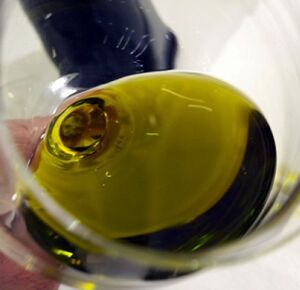Aprutino Pescarese (Pescara olive oil)
DOP Aprutino Pescarese is an Italian extra virgin olive oil with the following chemical and organoleptic characteristics:

- Acidity: max. 0.60%
- Peroxides: < 12 Meq02/kg
- Polyphenols: ž 100 ppm
- Colour: from green to yellow
- Aroma: medium to very fruity
- Flavour: fruity
The production area of " Aprutino Pescarese" DOP oil is located within the province of Pescara.
The growing of olives in the province of Pescara goes back to ancient times, and this is proved by historical evidence from Roman times. Olive growing is represented in the coat-of-arms of many old families, showing an olive tree or branch. The growing of olives is an integral part of the area from the economic, historic and scenic viewpoints. In modern times an important testimony to the presence of olive growing in the province of Pescara is found in the literature of Gabriele D'Annunzio.
"Aprutino Pescarese" extra virgin olive oil is produced from healthy olives, harvested directly from the tree between 20 October and 10 December of each year. The per hectare yield of olives may not exceed 9,000 Kg/ha in the specialised olive-groves, with a maximum oil yield of 22%. The only extraction methods permitted are those physical and mechanical processes suitable for producing oils which preserve as faithfully as possible the particular and original characteristics of the fruit.
The designation of origin for extra virgin olive oil in this area is justified not only by the very extensive growing of olives but also by the widespread concept of olive oil as a staple of the traditional diet in the province of Pescara. The entire area was first known historically as Aprutium, and later as Aprutina, whence the choice of the name Aprutino. Furthermore, the very ancient presence of olive growing in this area is due to the soil and climatic conditions favourable for the natural growth of the olive. Within a few kilometres of the coast are gentle hills which are ideal for growing olive trees. A system of social, cultural and economic relationships and exchanges have been created around olive growing in this area, such as festivals, exhibitions, oil-mills and producers' cooperatives, which are closely interconnected in a web of thriving activities. As evidence of this, and of the local use of the name "Aprutino", documentation taken from a publication of the Commune of Loreto Aprutino is enclosed in the historic account
Reference: The European Commission
#olive #olives #oliveoil #fruit #condiments #storecupboarditems #oils